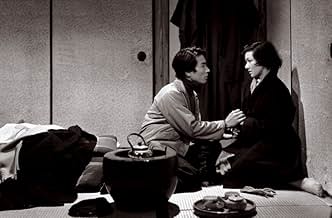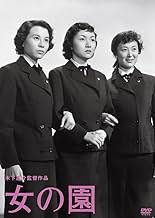Adicionar um enredo no seu idiomaA student at a woman's university takes a controversial action against the school's old-fashioned doctrines.A student at a woman's university takes a controversial action against the school's old-fashioned doctrines.A student at a woman's university takes a controversial action against the school's old-fashioned doctrines.
- Prêmios
- 8 vitórias e 1 indicação no total
- Direção
- Roteiristas
- Elenco e equipe completos
- Produção, bilheteria e muito mais no IMDbPro
Enredo
Você sabia?
- CuriosidadesHideyo Amamoto's film debut.
- Citações
Tomiko Takioka: I have the right to reject what I dislike. You made it hard for me to go home. What did I do wrong? I'm no longer a child!
- ConexõesFeatured in Century of Cinema: Nihon eiga no hyaku nen (1995)
Avaliação em destaque
It was a bit surprising to see young Japanese women of the early 1950s in a conservative school asserting themselves so forcefully. Likewise, the open discussion of political thinking and social movements was surprising open especially in comparison to other movies of that time such as "Twenty Four Eyes" wherein it was present but understated and often pushed to the background.
I found the story and the subplots to be nuanced, very compelling and emotionally fully engaging.
Hideko Takamine and Yoshiko Kuga both put in strong performances. Takamine is believable as someone emotionally torn who finds the various pressures overwhelming. Kuga's character is more complicated but she handles the various levels effectively.
The movie might seem long but I think it usefully could have been longer. Alternatively, some attention could have been shifted away from Takamine's character and into others. There are a large number of characters and although we get good development in some cases, we don't get a chance to be fully introduced to each of them. If we had, it would have made the motivations of all of them more clear. One example is the school's counselor who seems to be torn between sympathy for the students, his opinions of his colleagues and his role in the school. We don't get much insight into his personal perspective, we just get the results and have to speculate.
There are a number of sub plots going on and I can see how one could get some of the secondary characters confused at times. We are also left a bit unclear about the precise chain of command in the school's hierarchy. Who ultimately calls the shots there and who would be expected to take responsibility of various events is not clear. Perhaps some improvements in the script and/or the editing could have handled that better.
We also get some parochial sentimentality that is very standard Japanese fare but I don't think it is overdone at all.
I found the story and the subplots to be nuanced, very compelling and emotionally fully engaging.
Hideko Takamine and Yoshiko Kuga both put in strong performances. Takamine is believable as someone emotionally torn who finds the various pressures overwhelming. Kuga's character is more complicated but she handles the various levels effectively.
The movie might seem long but I think it usefully could have been longer. Alternatively, some attention could have been shifted away from Takamine's character and into others. There are a large number of characters and although we get good development in some cases, we don't get a chance to be fully introduced to each of them. If we had, it would have made the motivations of all of them more clear. One example is the school's counselor who seems to be torn between sympathy for the students, his opinions of his colleagues and his role in the school. We don't get much insight into his personal perspective, we just get the results and have to speculate.
There are a number of sub plots going on and I can see how one could get some of the secondary characters confused at times. We are also left a bit unclear about the precise chain of command in the school's hierarchy. Who ultimately calls the shots there and who would be expected to take responsibility of various events is not clear. Perhaps some improvements in the script and/or the editing could have handled that better.
We also get some parochial sentimentality that is very standard Japanese fare but I don't think it is overdone at all.
- a666333
- 12 de jun. de 2015
- Link permanente
Principais escolhas
Faça login para avaliar e ver a lista de recomendações personalizadas
Detalhes
- Data de lançamento
- País de origem
- Idioma
- Também conhecido como
- The Garden of Women
- Empresa de produção
- Consulte mais créditos da empresa na IMDbPro
- Tempo de duração2 horas 21 minutos
- Cor
- Mixagem de som
- Proporção
- 1.37 : 1
Contribua para esta página
Sugerir uma alteração ou adicionar conteúdo ausente

Principal brecha
By what name was Onna no sono (1954) officially released in Canada in English?
Responda































